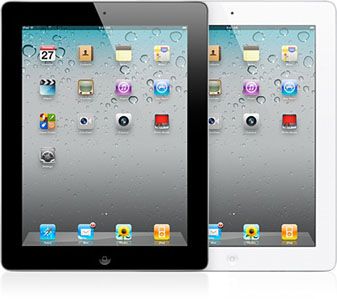- Qualcomm Launches Snapdragon 4 Gen 2 Mobile Platform
- AMD Launches Ryzen PRO 7000 Series Mobile & Desktop Platform
- Intel Launches Sleek Single-Slot Arc Pro A60 Workstation Graphics Card
- NVIDIA Announces Latest Ada Lovelace Additions: GeForce RTX 4060 Ti & RTX 4060
- Maxon Redshift With AMD Radeon GPU Rendering Support Now Available
Apple Dominates Tablet Sales During Q4 2010
About a year ago, Apple released its iPad ‘tablet’ to the world, and in doing so started a chain reaction. At first, many were skeptical to believe that tablets could hold a real market, but it didn’t take long before it was proven that yes, many people do want tablets. Not long after the iPad’s launch, companies like Samsung, Motorola and even BlackBerry announced plans to release their own tablets, and as of the time of writing, most of these are commercially available today.
Up to this point, Samsung has been the company to demand the most attention and market-share against Apple. During Q4 2010, the company secured a 17% share, which may look paltry compared to Apple’s 73%, but Samsung’s Tab hasn’t been available for nearly as long. “Other” tablets accounted for the other 10%.
Although the selling performance of Samsung’s Tab is good, analysts seem to be in agreement that it’s unlikely that it, or others, will gain much of a marketshare in 2011. Instead, thanks in part to Apple’s iPad 2 follow-up, the Cupertino company is likely to reach and retain an 80% marketshare throughout the year.
A major reason for Apple’s domination is quite simple, analysts say. While anyone can walk into an Apple Store and pick up an iPad without a contract, most of the other major tablets do require some sort of carrier contract (which, let’s face it, is ridiculous). Plus, there are other problems that help ease Apple’s tension, such as the fact that Motorola’s Xoom shipped missing a couple of key features. It seems at this point in time, Samsung is the only real competitor to Apple.
In the eReader market, Amazon owns just over 50% thanks to its Kindle, so it’s been rumored that the company may release a full-blown tablet at some point. It could be done, as Amazon has clearly proven that it knows what its doing where a hand-held tablet is concerned. If companies like Motorola or BlackBerry can’t get it right, perhaps Amazon can.

The overall tablet market grew 124 percent consecutively from third quarter to fourth quarter 2010, outpacing IDC’s previous projections. IDC recorded a total of 10.1 million “media tablets” sold in the fourth quarter, up from 4.8 million the previous quarter. Apple sold a smidge more than 7.3 million iPads, good for 73 percent market share. Samsung managed to capture 17 percent share according to IDC, suggesting Samsung moved about 1.7 million units. The remaining 10 percent of the market belonged to “a number of smaller regional players.”




